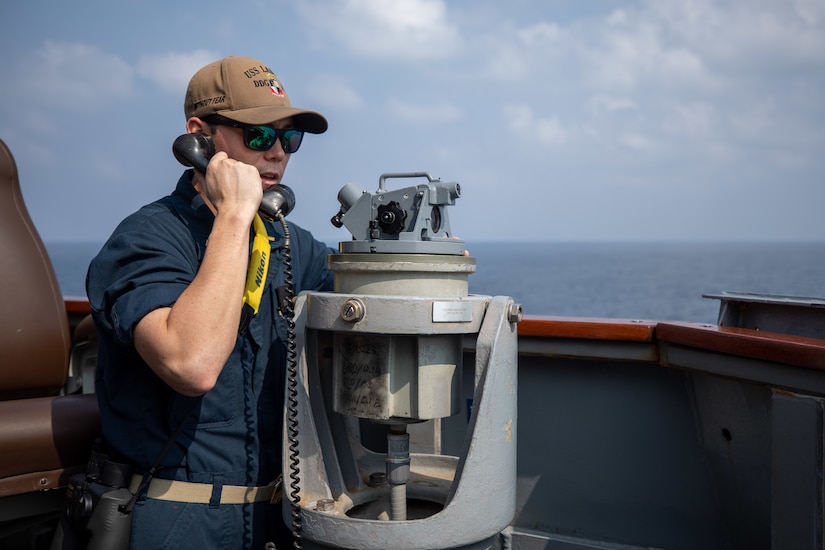The Defense Department is highly confident that yesterday’s strikes against Houthi military targets in Yemen were effective in degrading the rebel group’s ability to carry out further attacks against commercial ships operating in the Red Sea, a senior Pentagon official said today.
Army Lt. Gen. Douglas A. Sims II, director of operations for the Joint Staff, said joint forces from the U.S. and United Kingdom launched more than 150 munitions from both maritime and air platforms against more than 16 locations controlled by the Iranian-backed militants.
“At this point, we continue to conduct battle damage assessment of the various targets,” Sims said. “We feel very confident about where our munitions struck.”
The deliberate strikes, which were carried out with nonoperational support from Australia, Bahrain, Canada and the Netherlands, were assessed to have hit multiple targets across each location.
Those targets included command and control nodes, munitions depots, launching systems, production facilities and air defense radar systems used by the Houthi’s to carry out attacks against vessels operating in international waters.
“We know precisely the capability that the Houthis have been employing against the Red Sea and the Bab al Mandab,” Sims said. “This was solely designed to get after the capability that is impeding international freedom of navigation in international waters. We feel pretty confident we did good work on that.”
Defense Secretary Lloyd J. Austin III issued the order for U.S. Central Command Commander General Michael E. Kurilla to carry our the strikes yesterday following a series of attacks launched by Houthis against commercial ships operating in the region.
“This action is intended to disrupt and degrade the Houthis’ capabilities to endanger mariners and threaten global trade in one of the world’s most critical waterways,” Austin said in a statement following the strikes. “Today’s coalition action sends a clear message to the Houthis that they will bear further costs if they do not end their illegal attacks.”
Austin added that the U.S. “maintains its right to self-defense and, if necessary, will take follow-on actions to protect U.S. forces.”
Defense officials said today that Austin monitored the strikes in real time and conducted a call with the National Security Council and U.S. Central command for initial post strike assessment following the operation.
Austin is continuing to monitor the situation today, officials said.
Since mid-November, Iran-backed Houthi rebels have launched more than two dozen attacks against merchant vessels operating in the Red Sea. Such attacks against the vital international shipping lane posed a vital concern and impacted international commerce across the globe.
In response, Austin announced the Dec. 18 launch of Operation Prosperity Guardian, an international maritime task force designed to defend against the attacks.
The operation brought together forces from 22 nations to address the challenges in the region and ensure freedom of navigation in the Red Sea and Gulf of Aden.
The forces operate under the umbrella of the Combined Maritime Forces and the leadership of Task Force 153, a U.S. Navy-led initiative focused on maritime security in the Red Sea. Earlier this week, the rebel group launched nearly 20 drones and several missiles targeting U.S. ships underway in the region. That attack was defeated by U.S. and U.K. forces operating in the region as part of Operation Prosperity Guardian.
Yesterday’s strikes launched against the rebel stronghold in Yemen were not associated with, and are separate from, Operation Prosperity Guardian, the Pentagon official said.
The defensive strikes followed sustained diplomatic efforts and broad international condemnation of the Houthi attacks that have threatened global commerce.
Last week, the governments of the U.S., Australia, Bahrain, Belgium, Canada, Denmark, Germany, Italy, Japan, Netherlands, New Zealand and the United Kingdom issued a joint statement condemning the attacks and warning the rebel group against further escalation.
In the statement, the nations warned that the Houthis “will bear the responsibility of the consequences should they continue to threaten lives, the global economy and [the] free flow of commerce in the region’s critical waterways.”
Earlier this week, the United Nations Security Council adopted a resolution demanding that the rebel group cease all attacks against ships in the Red Sea.
In a statement following yesterday’s strike, the governments of the U.S., Australia, Bahrain, Canada, Denmark, Germany, Netherlands, New Zealand, South Korea and the United Kingdom issued a joint statement further condemning the Houthis’ actions and warning against further escalation.
The nations’ statement read that the strikes “demonstrated a shared commitment to freedom of navigation, international commerce and defending the lives of mariners from illegal and unjustifiable attacks. Our aim remains to de-escalate tensions and restore stability in the Red Sea, but let our message be clear: We will not hesitate to defend lives and protect the free flow of commerce in one of the world’s most critical waterways in the face of continued threats.”








